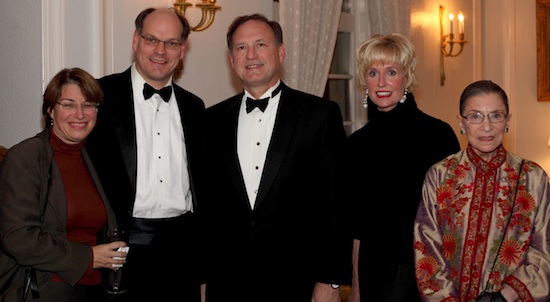
The country with the most Nobel prizes awarded per capita is the tiny island of Saint Lucia, boasting two laureates among its population of 160,000.
Only two countries in the top 14 have more than 100 prizes; we, the United States, come in 15th with a ratio of 11 laureates per 10 million people. But that means the U.S. has been awarded 338 prizes since their inception, and that's more than double any other country on the list (not counting the EU). We hold the undisputed lead; but just like in any match, if we get complacent, we'll lose it. And we can't let that happen. The American Nobels are feted in our capital city before they head to Stockholm for Nobel Week, a week of festivities that one laureate described as a fairy tale come true. Here in the states, though, the Nobels were preparing for a short meet-and-greet with President Obama. On November 29th they all gathered for a breakfast hosted by Swedish Ambassador to the United States Jonas Hafström. He asked them what they would say if the president questioned them on how to keep America innovative and creative.
 Senator Amy Klobuchar, John Bessler, husband of Senator Klobuchar, Supreme Court Justice Samuel Alito, Coach Kathy Kemper, and Supreme Court Justice Ruth Bader Ginsburg. Photo credit: Swedish Embassy
Senator Amy Klobuchar, John Bessler, husband of Senator Klobuchar, Supreme Court Justice Samuel Alito, Coach Kathy Kemper, and Supreme Court Justice Ruth Bader Ginsburg. Photo credit: Swedish Embassy
Almost all of them agreed: the grant system inhibits innovation. Many (if not most) academic scientists in the U.S. are funded by granting agencies like the NIH or the NSF, and a successful grant application requires lots of preliminary results. In other words, you have to prove you can do something before you can get the money to do it. And this, according to this year's Nobels, is a catch-22 that favors inside-the-box thinking and risk aversion. We should be taking risks, the Nobels said, not avoiding them. We should be encouraging ideas from outside the established community, from diverse sources; we should accept failure as a necessary stepping stone to revolutionary progress. This probably sounds eerily familiar after an election season of posturing about "reaching across the aisle to engage all parties." It's funny to hear the same dialogue in a different field, and it just confirms the mission of the Institute for Education, to bring folks together, to find common ground, and to encourage risk-taking to solve our biggest problems.
